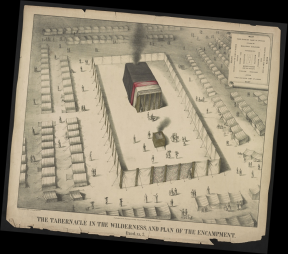Technology Redeemed?
The Tower of Babel was an example of technology used to rebel against God. In some ways, it was the opposite of a new project – the Tabernacle. Read this carefully, with technology in mind (as we defined it last time).

You shall speak to all the skillful, whom I have filled with a spirit of skill, that they make Aaron’s garments to consecrate him for my priesthood.
Exodus 28:3
Then Moses said to the people of Israel, “See, the LORD has called by name Bezalel the son of Uri, son of Hur, of the tribe of Judah; and he has filled him with the Spirit of God, with skill, with intelligence, with knowledge, and with all craftsmanship, to devise artistic designs, to work in gold and silver and bronze, in cutting stones for setting, and in carving wood, for work in every skilled craft. And he has inspired him to teach, both him and Oholiab the son of Ahisamach of the tribe of Dan. He has filled them with skill to do every sort of work done by an engraver or by a designer or by an embroiderer in blue and purple and scarlet yarns and fine twined linen, or by a weaver—by any sort of workman or skilled designer.
Exodus 35:30
As we think about this, remember the three keywords from the first part of our Biblical Anthropology study. Truth – we know the truth through the Bible. Dependence – we depend on the creation, on other people. But most importantly, all of creation depends on God. And – Purpose. Purpose in life comes from God.
And remember, yes, there is purpose in life – in this life, in the world. God Himself became man, and so we know that all of time and space has a real and eternal purpose.
And as we see how knowledge, engineering, art, and science permitted the Israelites to build the Tabernacle, we recognize that technology has a purpose and an eternal significance.
Another example? When Jesus wanted to give us a way to remember His death on the cross, what did He use? The results of human technology. Wine and bread.
And the cross? Human technology.
Good technology is the use of our knowledge of God’s creation the fulfill the Mandate of Creation to glorify God and to bring others to Him.
We use technology for His glory. And we all use technology in some way. But we should be using it to help others and to glorify God. In our workplace. In our home. And if you’re in school, learn as much as you can about the creation so that you can maximize your use of it!
Think about the sound system in a church. A hospital. Highways. Antibiotics. A violin. A toilet. Soap. The internet. All of these things can be used for a good purpose.
Joy Ridderhof was a missionary in Honduras In the 1930s. But she became ill and had to leave, assuming that she would be back in a few weeks. But her health didn’t improve sufficiently.
She remembered a poor widow that she had left behind. The widow didn’t know how to read, and couldn’t even memorize a verse of the Bible. How could Joy help her now? And others like her?
Then she remembered how people in the village listened to music on their record players.
What if… what if she recorded her own voice, and sent it to her friend back in Honduras? And she did just that. And before too long, people all over Central America were asking for Bible recordings from Joy.
Later, a group of native Americans asked for recordings in their language. It looked like she would need some help!
Eventually, Joy started an organization. The Gospel Recordings Network, or GRN, now has recordings in over 6000 languages.
Here is a woman who used technology to glorify God all around the world.
So there is no doubt that we can cooperate with God to use technology for good things – to help others, and bring them to Him.
But this raises some questions. For example, is technology completely neutral? Or, maybe we should say, is an item made using technology neutral? Ready to be used equally for good or evil? Should we only evaluate whether a use of technology is directly sinful or not, or should we evaluate these new discoveries and applications in themselves?
It was a big question in the last century. If you can make a bomb that can destroy a city – should you? Or should you even continue to pursue knowledge that would allow you to do it (instead of pursuing other knowledge)? Because, after all, someone will figure it out if you don’t – what if it’s your enemy? Is the bomb bad in itself? What If it’s used as a deterrent?
And similar questions must be applied as we approach new technologies – and we will get to artificial intelligence, transhumanism, CRISPR and genetics…
